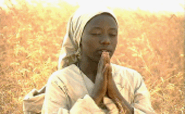Spell My Name, 2005
In the opening sequence of Tawanda Gunda Mupengo’s Spell My Name, a self-assured schoolteacher from the city, newly arrived into the village school and appearing immediately out of place in the rural farming community in her sharply tailored dress, encounters an introverted girl under a tree who ignores her request for directions and continues to busily sketch in her notebook. Immediately put off by the girl’s apparent disrespect and the relatively primitive conditions of the school, the teacher is quick to articulate her displeasure to the schoolmaster, and requests an immediate transfer to another district – a transfer that will take a month to process. Resigned to the immediate task of fostering the children’s education during her abbreviated tenure, the teacher continues to be frustrated by the girl’s impenetrable aloofness and increasingly distractive, troubled drawings, often sending her to the schoolmaster’s office for discipline, until the girl’s desperate, tale-tell gesture betrays the cause of her inarticulable torment. Shot in episodic ellipses that create a distilled, yet essential framework for the evolution of teacher and student’s relationship from resigned frustration to profound empathy, Spell My Name is an intelligently conceived cautionary tale on the perils of stereotype, silence, denial, and blind obedience.
At the Water, 2005
A collaborative film from the Women Filmmakers of the Zimbabwe Production Skills Workshop, At the Water is an acute and poetic allegory for the often colliding moral dilemma between imposed religion and entrenched superstitions in seemingly progressive, yet still deeply traditional cultures. Opening to the image of a devout Christian woman, Netsai who, as the film begins, accompanies her husband to the main road one morning as he goes off to work and who, along the way, crosses path with an enigmatic stranger dressed in a dark suit only moments before witnessing her husband’s sudden death in an automobile accident, the film chronicles Netsai’s emotional – and psychological – descent in the aftermath of the tragedy. Withdrawing from the community, Netsai and her young son retreat into a life of insular, if devoted quotidian ritual, until one day when her son vanishes without a trace near the riverbank. Unable to find solace in her faith, she turns to the village spiritual healer, who reveals that the river god exacts an inhuman price in exchange for the child’s safe return. Filmed in digital video, the striking, high contrast color palette of At the Water proves ideally suited to the film’s overarching themes of testing faith, divine silence, and moral absolutes in a time of spiritual crisis and profound desolation.
Growing Stronger, 2005
Framed as an inspiring and provocative collage on the changing face of HIV and AIDS, Tsitsi Dangarembga’s Growing Stronger presents an illuminating (and empowering) profile of two remarkably courageous Zimbabwean women living with HIV from opposite ends of the socioeconomic ladder who defy the stereotypical image of HIV infection and AIDS, and use their first hand experiences with the disease as a forum for public education and awareness. The documentary primarily focuses on well known celebrity, Tendayi Westerhof, a former fashion model and businesswoman (and ex-wife of former Zimbabwean professional football manager, Clemens Westerhof) who, in 2002, broke the commonly held silence among sufferers of HIV and AIDS (whose deaths were often nebulously attributed to secondary, AIDS-related illnesses or simply euphemized as succumbing to death “after a long illness”) and publicly disclosed her HIV positive status. Founding the organization, Public Personalities Against AIDS Trust (PPAAT), Westerhof now devotes much of her time to erasing the stigma of the disease, not only through personal projects such as Models against AIDS which seeks to bring awareness to the younger generations, but also through living by example, constantly emphasizing the importance of nutrition, exercise, and regular medical monitoring in her public and personal life. A similar message of healthy living is also articulated by Pamela Kanjenzana, a working class HIV positive woman who comments on her occasional difficulty in obtaining proper nutrition and medication with her limited income, but nevertheless, copes as best as she can, and who, unlike previous generations, is able to see a real future, even living with HIV. It is interesting to note that by focusing on Westerhof over Kanjenzana, the film also reinforces the idea of HIV as an indiscriminate, cross-cultural disease. Ironically, it is through this relative subordination of Kanjenzana’s story over Westerhof’s that Dangarembga illustrates, not a preferential treatment of celebrity, but rather, the paradoxical collapse of socioeconomic boundaries in the constant threat – and everyday reality – of HIV and AIDS.
© Acquarello 2007. All rights reserved.
